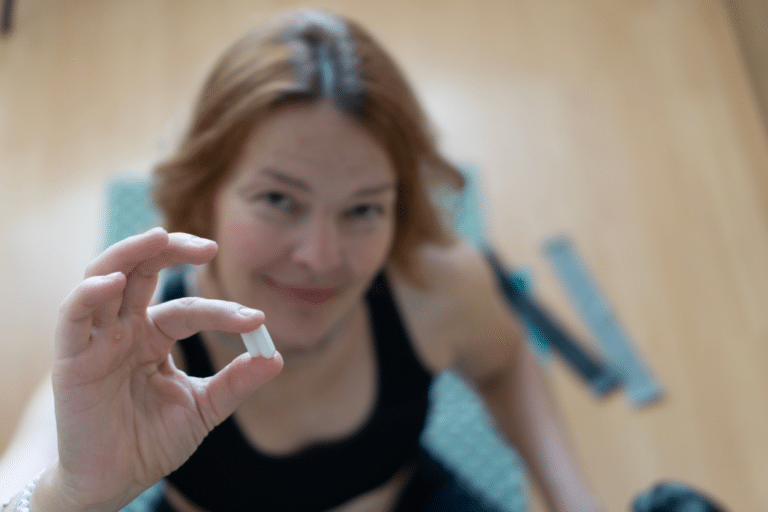Many women struggle with new or worsening depression when the hormone changes of perimenopause begin.
Signs of depression can include one or more of the following: sadness, loss of energy, feelings of hopelessness or worthlessness, loss of enjoyment, difficulty concentrating, uncontrollable crying, difficulty making decisions, irritability, increased need for sleep, insomnia or excessive sleep, a change in appetite causing weight loss or gain, and thoughts of death or suicide.
A visit to the doctor for this will net a prescription for an antidepressant 99.9% of the time. But is this the answer?
Antidepressants can be very helpful when rapid relief of depressive symptoms is needed. But they do nothing to correct underlying hormone imbalances and have long-term health consequences.
The most commonly used drug class, SSRIs, don’t work by boosting production of serotonin. Instead, they inhibit the reuptake of it in the connections between neurons, or synapses. Over time, the body will upregulate the MAO enzyme to break down all that serotonin that’s hanging around, ultimately depleting it. MAO also breaks down dopamine, causing even greater neurotransmitter imbalances. Add to this the fact that stopping SSRIs is notoriously hard and requires a long tapering period for women who have been taking them for years.
We classically think of sex hormone changes as the reason for new depression in perimenopause, and for some women that is the case. Changes in the balance of estrogen and progesterone are often contributors to the problem. But if we look further upstream in the body, there are often other surprising (and easily fixable) reasons.
The first is dehydration.
Researchers believe that even mild dehydration has an affect on your moods. Two studies from the Human Performance Laboratory at the University of Connecticut show that small changes in hydration status alter your energy level, mood, and ability to think clearly.
If you wait to drink water until you are thirsty, you’ve waited too long. It’s best to sip all day long and aim for approximately ½ ounce of water per pound of body weight. It’s also helpful to get rid of dehydrating substances in the diet like alcohol and caffeine. If you have underlying adrenal issues, you may need to consume more water than what’s recommended because of cellular metabolism changes that result from dysregulated cortisol..
Next up…
Chronic Sleep Deprivation
Lack of sleep raises cortisol, which over the long term can contribute to depression. Take a look at your bedtime routine. What are you doing after dinner? Stay away from the news and stay off your screens. Better choices include reading, listening to music, taking a warm bath, or snuggling with your partner. There are also supplements that can help with sleep. You can read more about that here.
The third hidden contributor to depression in perimenopause is crap food.
Women who eat food that is loaded with artificial ‘stuff’ are more likely to struggle with mood imbalances. Problem ingredients include colors and dyes, artificial sweeteners, and pesticides (among others). All of these things can drive neurological reactions. Also, if you don’t feel well, your tendency to self-medicate with food increases dramatically.
Do YOU know any depressed people who wake up one day and decide to live a really healthy lifestyle? Me either. People don’t DO that when they don’t feel well! They do things that trigger a hit of dopamine, serotonin, or adrenaline because that makes for a happier brain and temporarily better mood.
When it comes to food choices, make sure your diet is full of omega-3 fatty acids (supplement if needed), B vitamins (stress burns through Bs), and magnesium. Some studies have shown magnesium supplementation to be as effective as SSRI medications. Choose the glycinate, taurate, or threonate forms.
The lifestyle choices you make can have a profound effect on how you weather stressful times. However, if you’ve made changes and are still struggling, it may be time to consider the role of hormone imbalances. Testing can identify areas to target for support. As always, if you are having suicidal thoughts, please contact a mental health professional immediately.
Dr. Anna Garrett is a menopause expert and Doctor of Pharmacy. She helps women who are struggling with symptoms of perimenopause and menopause find natural hormone balancing solutions so they can rock their mojo through midlife and beyond. Dr. Anna is the author of Perimenopause: The Savvy Sister’s Guide to Hormone Harmony. Order your copy at www.perimenopausebook.com.
Dr. Anna is available for 1-1 consultations. Find out more at www.drannagarrett.com/lets-




